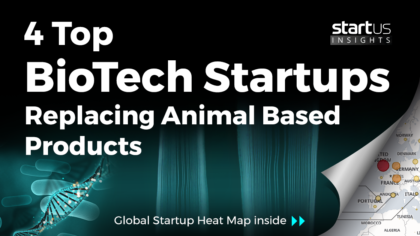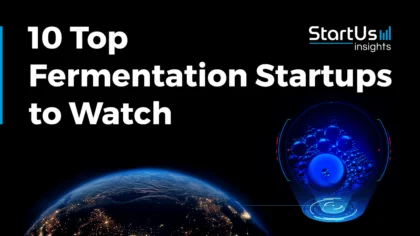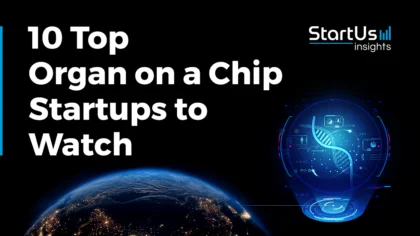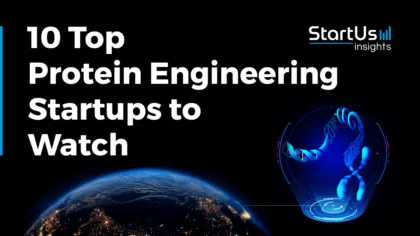Accelerate Productivity in 2025
Reignite Growth Despite the Global Slowdown
Our Innovation Analysts recently looked into emerging technologies and up-and-coming startups working on solutions for the biotechnology sector. As there are a lot of startups working on various different applications, we want to share our insights with you. Here, we take a look at 4 promising synthetic biology startups that manufacture alternatives to animal products.
Heat Map: 4 Top Synthetic Biology Startups Making Animal Products
For our 4 top picks, we used a data-driven startup scouting approach to identify the most relevant solutions globally. The Global Startup Heat Map below highlights 4 interesting examples out of 87 relevant solutions. Depending on your specific needs, your top picks might look entirely different.
Perfect Day – Dairy-Free Milk
Dairy is so unsustainable that 144 gallons of water, mostly used to grow animal feed, is needed to produce a gallon of milk. Vast amounts of grasslands are fell to grow dairy farms; the disposal of manure and fertilizers pollute water bodies, and methane produced by the cattle is a major source of greenhouse gases. Using synthetic biology to produce non-animal-based dairy solves both the ethical and sustainability challenges facing the industry.
Perfect Day, a US-based startup, replaces cows in the milk creation process with microbes that are programmed to produce casein and other milk proteins. This allows them to make lactose-free milk and precisely control its nutritional profile. To scale production, they plan to join forces with leaders in the dairy and food industries. After having established a process to grow milk proteins, the company has announced plans to start working on animal-free milk fats as well.
Spiber – Spider Silk
Spider silk, the fine thread spider webs are made of, is one of the strongest materials produced by a living organism. It is five times stronger than steel of the same diameter and as strong as Kevlar, which is used to produce bullet-proof jackets. However, the territorial and cannibalistic nature of spiders makes it impossible to rear them to harvest this fiber.
The Japanese company Spiber develops spider silk by fermenting microbes that carry the silk-producing gene naturally found in spiders. They have optimized every step of the process, from introducing the gene in microbes to purifying the final product, for it to be commercially viable at scale. The company has previously collaborated with North Face to mass-produce a jacket.
Pembient – Rhino Horn
Animal products such as rhino horns, pangolin skins, and ivory – even though illegal – are some of the most traded animal commodities globally. Their demand stems largely from either belief in their potency in traditional medicine in the East or their aesthetic allure in the luxury fashion industry in the West. This has put many species at risk of extinction. Lately, there has been some work towards creating synthetic alternatives to these products which can be used to flood the markets.
Pembient, a US-based startup, creates bioengineered wildlife products as a cheaper alternative to the black market that threatens many endangered species. The company develops an ink that contains keratin, a protein present in both rhino horn and human hair, and is then used to 3D print the horn substitute. This bio-fabricated horn is identical to the rhino horn and is marketed to artisans and designers.
BEOnChip – Organ On A Chip
Animal-testing has long been an unnecessary evil for biotechnology companies producing drugs and cosmetics. Ethical questions aside, the need for animals considerably raises the costs involved in clinical trials. With recent developments in bio-fabrication, it is possible to create organ-on-chip models or mini-organs that mimic the responses of actual organs. With such models, the companies aren’t just limited to animal organs and can test on human organ models as well.
The Spanish startup BEOnChip, short for the biomimetic environment on-chip, develops microfluidic chips that reproduce different physiological responses of organs. They produce chips suited to test different kinds of environments such as chemical gradients or shear stress. They assist their customers with throughout all phases of making an organ on a chip – design, development, prototyping, validation, and industrialization.
What About The Other 83 Synthetic Biology Startups?
While we believe data is key to creating insights, it can be easy to be overwhelmed by it. Our ambition is to create a comprehensive overview and provide actionable innovation intelligence for your Proof of Concept (PoC), partnership, or investment targets. The 4 synthetic biology startups showcased above are promising examples out of 87 we analyzed for this article. To identify the most relevant solutions based on your specific criteria and collaboration strategy, get in touch.








